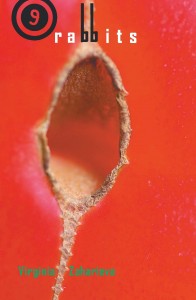Published by Istros Books 30 September
250pp, paperback, £9.99
Reviewed by Siân Miles
Istros, the ancient Thracian name for the Danube, has also been chosen by an enterprising and innovative UK publishing house specializing in Central and South-Eastern European literature translated into English. Like the river, this independent house is rapidly becoming an equally busy international vector for the communication of ideas from an exciting new demographic of writers representing countries and cultures well beyond its earlier, more well-known banks.
A dazzling example is the work of the brilliant Bulgarian Virginia Zaharieva whose Nine Rabbits is a heady mixture of genres and styles which transcends the purely literary and approaches a new form of expression. Traditional European writing, in comparison with this thoroughly Balkan work, appears more than a little tired and derivative. Nine Rabbits brings with it a powerful sense of the genuinely mysterious and exotic as the narrator interweaves her experience of a wide range of different cultures, traditions and assumptions. At the same time, it celebrates the individual, and in cutting-edge style the universality of human female experience.
Written in the first person, it is divided into two parts recording the life of Manda, first as a child living in a small town on the Black Sea and secondly as a sophisticated cosmopolitan dividing her time between various glamorous capitals worldwide. Strikingly, the voices of both personae are near-identical: if the child is father of the man, she is also mother of the woman and there is moving as well as convincing identity of tone between the six and the forty-six year old narrator.
Like Proust’s A la recherche this is a story recording the birth and exercise of a vocation. In Proust’s case, it was exclusively that of a writer. Equally close to this narrator’s heart, however, is the understanding that she is a communicator, not necessarily through the medium of writing alone. Garlanded with prizes and accolades and dripping with degrees and diplomas, she becomes aware of a variety of paths always open to her: criss-crossing and interconnected, all lead to the expression of joy in the gift of life.
The initial setting is Sixties Bulgaria under the twin rule of Soviet politics and Manda’s poverty-stricken grandmother Nikula. Having lost her own mother at the age of two, and herself brought up by a cruel stepmother who set her to work at an early age, Nikula is a severely damaged individual whose premeditated cruelty to those in her charge is both pathological and unavoidable. The family kittens meet the same culinary fate as the Fatal Attraction pet rabbits and punishments include thrashing with nettles to the point of unconsciousness. Nikula’s seething fury and resentment is caused by the vivid contrast between her situation and that of the narrator’s grandfather, an attractive, life-affirming Jack-of-all-trades and ladies’ man whose near-permanent absence as well as that of Manda’s single, working mother, the little girl feels keenly. Yet from the depths of her daily humiliations, as well as physical and mental misery, Manda manages amused detachment, commenting on her torturer: ‘She was staring at the ceiling, where the instructions for what to do with terrible children were written.’
From her grandfather she inherits a deep love and understanding of nature, human, botanical and zoological. Her connection with flora and fauna is close and instinctive, becoming the lynchpin of her later intellectual understanding of the way the world works. We observe through her cool, child’s eyes the Prague Spring, an unexpected, dramatic reversal of power relations which has seismic effects on her family’s way of life.
The second part of Nine Rabbits records in random order the events of the next forty years in Manda’s own unusually rich life. Of her early schooling little remains save a humiliating failure to remember her lines. This becomes the leitmotiv of subsequent development in which she determinedly writes her own. The bruised and abused body of the child imprinted with pain is also capable, in rapturously sensual detail, of recording its absence in a world full to bursting with potential pleasures.
We follow her movements through a clearly distinguished academic career in literature and psychology, through lengthy and rigorous training in psychotherapy, through marriage, childbirth, separation, divorce, and reconciliation. We accompany her on travels and sojourns in Lisbon, Moscow, Vienna, Paris, Osaka, Dominica and elsewhere, witnessing the gradual emergence and recognition of the natural poet the secret of whose life lies in her constant alertness to it. Again, we are always aware of the potentially comic in a wide range of situations and in the company of a large number of characters. Part of a cultural delegation on an international tour, she lampoons the seriousness with which many take themselves: ‘These guys are obsessed with expressing themselves. I imagine how their dicks are hanging despondently in the darkness of their pants, having drained all their eroticism in the direction of tongues hopelessly entangled in perfidious analysis.’
Angela Rodel’s translation is racy and vibrant. It develops a mid-Atlantic accent in which people are starkers and hit on the noggin while at the same time, described under the influence of ganja as seriously baked and acting like in first-grade. What might appear as lurches and inconsistencies of tone are imitative of the content and the huge geographical and chronological leaps taken by the narrator herself who is above all else an avid listener and a collector of found sounds.
The book is peppered with recipes the vagueness of whose instructions invites experimentation and happy collusion. The rose-petal jam, if made with Albertines, is a delicate pale pink translation of smell into substance. Try it at home.

